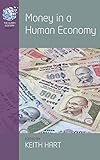Money in a Human Economy / ed. by Keith Hart’s.
Material type: TextSeries: The Human Economy ; 5Publisher: New York ; Oxford : Berghahn Books, [2017]Copyright date: ©2017Description: 1 online resource (314 p.)Content type:
TextSeries: The Human Economy ; 5Publisher: New York ; Oxford : Berghahn Books, [2017]Copyright date: ©2017Description: 1 online resource (314 p.)Content type: - 9781785335594
- 9781785335600
- 332.4 23
- HG231 .M5864 2017
- online - DeGruyter
| Item type | Current library | Call number | URL | Status | Notes | Barcode | |
|---|---|---|---|---|---|---|---|
 eBook
eBook
|
Biblioteca "Angelicum" Pont. Univ. S.Tommaso d'Aquino Nuvola online | online - DeGruyter (Browse shelf(Opens below)) | Online access | Not for loan (Accesso limitato) | Accesso per gli utenti autorizzati / Access for authorized users | (dgr)9781785335600 |
Frontmatter -- Contents -- Part I. Introduction -- Introduction. Money in a Human Economy -- Chapter 1. Capitalism and Our Moment in the History of Money -- Part II. Thinking About Money -- Chapter 2. Money is Good to Think: From “Wants of the Mind” to Conversation, Stories, and Accounts -- Chapter 3. The Shadow of Aristotle: A History of Ideas about the Origins of Money -- Chapter 4. Luxury and the Sexual Economy of Capitalism -- Part III. The Evolution of Money Today -- Chapter 5. The Future of Money is Shaped by the Family Practices of the Global South -- Chapter 6. Remittance Securitization in the Hemisphere of the Américas: From Wall Street to Calle Principal and Back -- Chapter 7. Cross-Border Investment in China -- Chapter 8. Value Transfer and Rent: Or, I Didn’t Realize My Payment Was Your Annuity -- Chapter 9. Bitcoin as Politics -- Part IV. Money in Its Time and Place -- Chapter 10. A South Asian Mercantile Model of Exchange: Hundi during British Rule -- Chapter 11. Money and Markets For and Against the People: The Rise and Fall of Basotho’s Economic Independence, 1830s–1930s -- Chapter 12. Gender and Money in the Argentinian Trueque -- Chapter 13. An Imaginary Currency: The Haitian Dollar -- Index
restricted access online access with authorization star
http://purl.org/coar/access_right/c_16ec
A human economy puts people first in emergent world society. Money is a human universal and now takes the divisive form of capitalism. This book addresses how to think about money (from Aristotle to the daily news and the sexual economy of luxury goods); its contemporary evolution (banking the unbanked and remittances in the South, cross-border investment in China, the payments industry and the politics of bitcoin); and cases from 19th century India and Southern Africa to contemporary Haiti and Argentina. Money is one idea with diverse forms. As national monopoly currencies give way to regional and global federalism, money is a key to achieving economic democracy.
Mode of access: Internet via World Wide Web.
In English.
Description based on online resource; title from PDF title page (publisher's Web site, viewed 25. Jun 2024)


